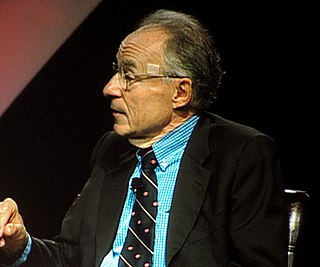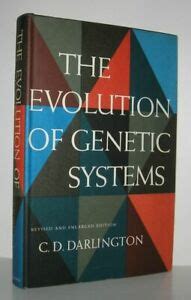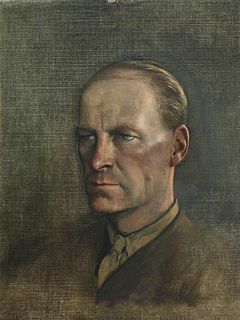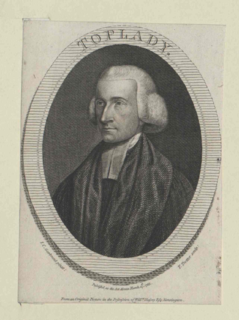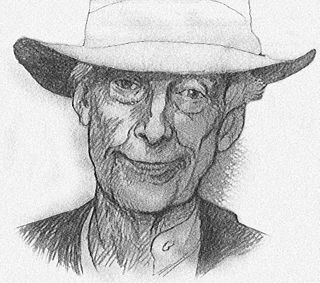Top 92 Infer Quotes & Sayings - Page 2
Explore popular Infer quotes.
Last updated on November 13, 2024.
When some say that good works are forbidden when we preach faith alone, it is as if I said to a sick man: "If you had health, you would have the use of all your limbs; but without health, the works of all your limbs are nothing"; and he wanted to infer that I had forbidden the works of all his limbs.
If there are a bunch of fruit trees, one can say that whoever created these fruit trees wanted some apples. In other words, by looking at the order in the world, we can infer purpose and from purpose we begin to get some knowledge of the Creator, the Planner of all this. This is, then, how I look at God. I look at God through the works of God's hands and from those works imply intentions. From these intentions, I receive an impression of the Almighty.
And when someone suggests you believe in a proposition, you must first examine it to see whether it is acceptable, because our reason was created by God, and whatever pleases our reason can but please divine reason, of which, for that matter, we know only what we infer from the processes of our own reason by analogy and often by negation.
Reading their letters and the First Amendment of the US Constitution, I infer that this nation's founders noted that religions have been at the center of great deal of trouble, so they precluded the US government from getting involved in religion, i.e. "... shall make no law respecting an establishment of religion, or prohibiting the free exercise thereof..." Over the centuries, various religions have laid claim to various morals; consider the difficulties outsiders are having today in the Middle East, for example.
These teachings in regard to woman so faithfully reflect the provisions of the canon law that it is fair to infer that their inspiration came from the same source, written by men, translated by men, revised by men. If the Bible is to be placed in the hands of our children, read in our schools, taught in our theological seminaries, proclaimed as God's law in our temples of worship, let us by all means call a council of women in New York, and give it one more revision from the woman's standpoint.
To punish a man because he has committed a crime, or because he is believed, though unjustly, to have committed a crime, is not persecution. To punish a man, because we infer from the nature of some doctrine which he holds, or from the conduct of other persons who hold the same doctrines with him, that he will commit a crime, is persecution, and is, in every case, foolish and wicked.
Cell genetics led us to investigate cell mechanics. Cell mechanics now compels us to infer the structures underlying it. In seeking the mechanism of heredity and variation we are thus discovering the molecular basis of growth and reproduction. The theory of the cell revealed the unity of living processes; the study of the cell is beginning to reveal their physical foundations.
The physicist, in his study of natural phenomena, has two methods of making progress: (1) the method of experiment and observation, and (2) the method of mathematical reasoning. The former is just the collection of selected data; the latter enables one to infer results about experiments that have not been performed. There is no logical reason why the second method should be possible at all, but one has found in practice that it does work and meets with reasonable success.
Contemporary philosophers have exercised themselves with the problem of our knowledge of other minds. Enmeshed in the dogma of the ghost in the machine, they have found it impossible to discover any logically satisfactory evidence warranting one person in believing that there exist minds other than his own. I can witness what your body does, but I cannot witness what your mind does, and my pretensions to infer from what your body does to what your mind does all collapse, since the premises for such inferences are either inadequate or unknowable.
Everything has a personality: everything sends an emotional signal. Even where this was not the intention of the designer, the people who view the website infer personalities and experience emotions. Bad websites have horrible personalities and instill horrid emotional states in their users, usually unwittingly. We need to design things-products, websites, services-to convey whatever personality and emotions are desired.
Howbeit your faith seeth but the black side of providence, yet it hath a better side, and God shall let you see it. ... “For we know that all things work together for good to them that love God,” ergo, shipwreck, losses, &c., work together for the good of them that love God: hence I infer, that losses, disappointments, ill tongues, loss of friends, houses, or country, are God's workmen, set on work to work out good to you, out of everything that befalleth you.
As historians, we refuse to allow ourselves these vain speculations which turn on possibilities that, in order to be reduced to actuality, suppose an overturning of the Universe, in which our globe, like a speck of abandoned matter, escapes our vision and is no longer an object worthy of our regard. In order to fix our vision, it is necessary to take it such as it is, to observe well all parts of it, and by indications infer from the present to the past.
Tis evident that all reasonings concerning matter of fact are founded on the relation of cause and effect, and that we can never infer the existence of one object from another, unless they be connected together, either mediately or immediately... Here is a billiard ball lying on the table, and another ball moving toward it with rapidity. They strike; and the ball which was formerly at rest now acquires a motion. This is as perfect an instance of the relation of cause and effect as any which we know, either by sensation or reflection.
What is natural in me, is natural in many other men, I infer, and so I am not afraid to write that I never had loved Steerforth better than when the ties that bound me to him were broken. In the keen distress of the discovery of his unworthiness, I thought more of all that was brilliant in him, I softened more towards all that was good in him, I did more justice to the qualities that might have made him a man of a noble nature and a great name, than ever I had done in the height of my devotion to him.
Their usual mistaken premise is that they affirm some consensus among people, at least among tame peoples, concerning certain moral principles, and then conclude that these principles must be unconditionally binding also for you and me-or conversely, they see that among different peoples moral valuations are necessarily different and infer from this that no morality is binding-both of which are equally childish.
I infer that God's decrees, and the necessity of event flowing thence, neither destroy the true free-agency of men, nor render the commission of sin a jot less heinous. They neither force the human will, nor extenuate the evil of human actions. Predestination, foreknowledge, and providence, only secure the event, and render it certainly future, in a way and manner (incomprehensibly indeed by us; but) perfectly consistent with the nature of second causes.
It is long ere we discover how rich we are. Our history, we are sure, is quite tame: we have nothing to write, nothing to infer. But our wiser years still run back to the despised recollections of childhood, and always we are fishing up some wonderful article out of that pond; until, by and by, we begin to suspect that the biography of the one foolish person we know is, in reality, nothing less than the miniature paraphrase of the hundred volumes of the Universal History.
Staying requires being curious about who you actually are when you don't take yourself to be a collection of memories.When you don't infer your existence from replaying what happened to you, when you don't take yourself to be the girl your mother/father/brother/teacher/lover didn't see or adore. When you sense yourself directly, immediately, right now, without preconception, who are you?
I fully agree with all that you say on the advantages of Spencer's excellent expression of 'the survival of the fittest.' This, however, had not occurred to me till reading your letter. It is, however, a great objection to this term that it cannot be used as a substantive governing a verb; and that this is a real objection I infer from H. Spencer continually using the words, natural selection.
Withal I did infer your lineaments,
Being the right idea of your father,
Both in your form and nobleness of mind;
Laid open all your victories in Scotland,
Your discipline in war, wisdom in peace,
Your bounty, virtue, fair humility;
Indeed, left nothing fitting for your purpose
Untouch'd or slightly handled in discourse.
I am aware of the technical distinction between ‘less’ and ‘fewer’, and between ‘uninterested’ and ‘disinterested’ and ‘infer’ and ‘imply’, but none of these are of importance to me. ‘None of these are of importance,’ I wrote there, you’ll notice – the old pedantic me would have insisted on “none of them is of importance”. Well I’m glad to say I’ve outgrown that silly approach to language
The aim of scientific thought, then, is to apply past experience to new circumstances; the instrument is an observed uniformity in the course of events. By the use of this instrument it gives us information transcending our experience, it enables us to infer things that we have not seen from things that we have seen; and the evidence for the truth of that information depends on our supposing that the uniformity holds good beyond our experience.
Mathematics is a logical method. . . . Mathematical propositions express no thoughts. In life it is never a mathematical proposition which we need, but we use mathematical propositions only in order to infer from propositions which do not belong to mathematics to others which equally do not belong to mathematics.
Whoever wishes to acquire a deep acquaintance with Nature must observe that there are analogies which connect whole branches of science in a parallel manner, and enable us to infer of one class of phenomena what we know of another. It has thus happened on several occasions that the discovery of an unsuspected analogy between two branches of knowledge has been the starting point for a rapid course of discovery.
As soon as a man and woman of almost any age are alone together within four walls it is assumed that anything may happen. Spontaneous combustion, instant fornication, triumph of the senses. What possibilities men and women must see in each other to infer such dangers. Or, believing in the dangers, how often they must think about the possibilities.
For all we know that English people are/ Fed upon beef - I won't say much of beer/ Because 'tis liquor only, and being far/ From this my subject, has no business here;/ We know too, they are very fond of war,/ A pleasure - like all pleasures - rather dear;/ So were the Cretans - from which I infer/ That beef and battle both were owing her
My experience is that journalists report on the nearest-cliche algorithm, which is extremely uninformative because there aren't many cliches, the truth is often quite distant from any cliche, and the only thing you can infer about the actual event was that this was the closest cliche. It is simply not possible to appreciate the sheer awfulness of mainstream media reporting until someone has actually reported on you. It is so much worse than you think.
If you look at Gothic detailing right down to the bottom of a column or the capital of a column, it's a small version of the whole building; that's why, like dating the backbones of a dinosaur, a good historian can look at a detail of a Gothic building and tell you exactly what the rest of the building was, and infer the whole from the parts.

